| Reviews & Columns |
|
Reviews DVD TV on DVD Blu-ray 4K UHD International DVDs In Theaters Reviews by Studio Video Games Features Collector Series DVDs Easter Egg Database Interviews DVD Talk Radio Feature Articles Columns Anime Talk DVD Savant Horror DVDs The M.O.D. Squad Art House HD Talk Silent DVD
|
DVD Talk Forum |
|
|
| Resources |
|
DVD Price Search Customer Service #'s RCE Info Links |
|
Columns
|
|
|
Ironweed
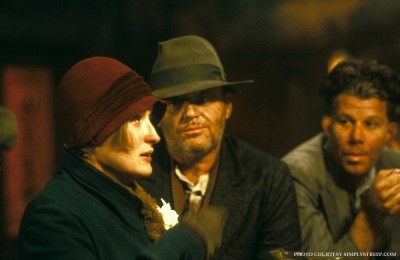
Please Note: The images used here are taken from promotional materials, not the current Blu-ray edition under review.
To a socially conscious filmmaker like Hector Babenco (an Argentine-born Brazilian filmmaker who, before he took Hollywood and Oscar with 1985's Kiss of the Spider Woman, made more or less directly activist narrative features in Brazil), it must have seemed like the right time for Ironweed. It was 1987, the "trickle-down" (or, more accurately, "leech-up") Reagan era; William Kennedy's 1984 Pulitzer prizewinning novel had harked back to an even rougher time -- the Great Depression -- for American workers; and Kennedy himself had adapted his novel into a screenplay just waiting for a director with the right sensitivity. In Babenco's hands, Kennedy's tale of Francis, a middle-aged bum wracked with guilt and pushed ever lower into the dregs of society, and Francis's girlfriend, Helen, a faded singer facing a similar shuffling, homeless, alcohol-dazed plight as times go from bad to worse circa 1938, should have been something that left a mark on your soul, opening up floodgates to buoy your consciousness. Instead, it's a respectable but oddly quiescent affair, and one can't help feeling that it's the big-studio milieu in which it was made, and the very high-profile great-actor stars (Jack Nicholson and Meryl Streep) on board, that robbed the film of too much of its soul for it to achieve what it could have.
It's certainly not that Nicholson or Streep purposely or willfully hog the spotlight, grandstand, or showboat; each of them seems physically and spiritually immersed in their characters in the self-effacing way of actors committed to their craft above and beyond any fame or acclaim they've attained or hope to receive. It's easy to see what drew them to the project: Streep's Helen is sad, defiant, sickly, and drunk the entire time; Nicholson's Francis is more lucid but also an alcoholic and humbled beyond repair by a checkered life of misfortune that only continues in the same way; and these are catnip-challenges to famous and successful Hollywood actors who want to understand and embody, from the inside out, people who are in no obvious way like themselves (plus, they get to appear alongside true-American-eccentric singer/songwriter/actor Tom Waits (Down by Law, Bram Stoker's Dracula, who plays Francis's even more tragic, terminally ill down-and-out pal). But Kennedy's tale is much, much more a character study than a "drama" with a very long plot arc (Pauline Kael, who disliked the film in no uncertain terms, perplexedly wrote "that's it" of its grim, minor-key, minuscule plot, which can accurately, if not completely, be summed up as: Depression-victim down-and-outers, at least the ones that don't actually die of their poverty, become inexorably more down and out over the course of the film's two and a half hours) and that doesn't seem to have meshed well with the milieu in which it was made -- which is to say under the auspices of the more prestigious but still big-studio, big-budget, profit-and-Oscar driven Columbia/Tri-Star -- or the undeniable star presence of its two hard-working leads, who here bear the unfair but very real brunt of that double-edged sword that gets unsheathed when you're a bona-fide Serious actor who becomes celebrated and bankable to their degree.
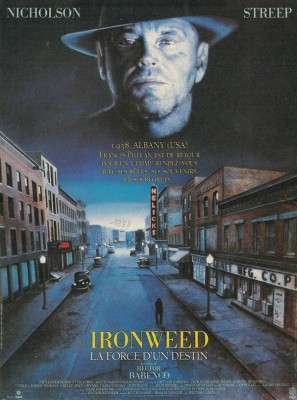
Thus, as we follow along through a few days' episodes meant to show us who Francis and Helen are and how they came to be that way -- their humanity, shown rather than told, so that we can understand and care for them without insulting them through oversimplification or sentimentality -- there's no egregious descent into bland convention, no sudden bursts of tear-jerking, no sudden moment where the film veers into shrug-worthy territory when it should, by dint of its subject, story, and the skill involved, be riveting all the way through. There's more of a very gradual, imperceptible slide, so that what looks in the film's opening sequences like it could be a stylistically well-considered and consistent, intimately devastating digging into the historical and personal layers of the Depression becomes, almost accidentally and in spite of itself, about the Moments -- the Moment where we cut to a close-up of Nicholson so he can deliver his killer line, the Moment where Streep can bust out her renowned versatility...the Moments where the director, script, cinematography/editing, everything seem to conspire against their best intentions and force them to become Nicholson! and Streep! instead of just plain ol' pitiful Francis and Helen, which shatters the spell that's supposed to have been cast by the film's sort of formalist rendering of Neorealist thematics and real-location-exteriors style (Lauro Escorel's lighting/camerawork, and the production/art design by Jeannine Oppewall and Robert Guerra, generally make for a subtly convincing and rich look), violating the terms the picture sets for itself (unlike Terms of Endearment or Postcards from the Edge, much more savvily set up from their very inceptions to integrate and use, respectively, the Nicholson/Streep star personae to their advantage, and therefore much less serious but notably more successful pictures than Ironweed). It's as if Babenco felt (perhaps rightly, on economic if not artistic terms) beholden to the studio and his undeniably Big stars to put in that close-up, to dwell more and more on the showy/heartstring-pulling moments (or to make subtle, ill-advised choices in an attempt have it both ways; the wobbly staging and tonal skittering of a scene wherein Francis visits the family he's abandoned make it a professional-looking, shapeless mess), or to allow otherwise fairly well-evaded hokeyness to creep into Francis's flashbacks (particularly the ones involving Nathan Lane, in an early role, as the ghost of a scab that a young union-activist Francis accidentally murdered during a strike).
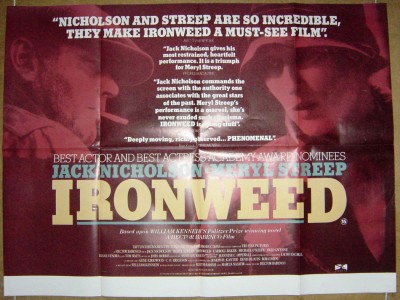
There's plenty nice to say about the film, too, however; if this review betrays the reviewer's ultimate disappointment in what is still, when all is said and done, a worthy if too-mixed effort, it's only because those bits that do work (the period detail, for example, actually does strike a nice balance and sticks to the plainspoken, un-showy, utilitarian heart of the film, and of course there are numerous moments where Nicholson and Streep are allowed to affect us just by being their distressingly lost, unheroic characters, whose specialness and particular goodness have to be hidden, kept safe from the brutal socioeconomic and natural elements, and will likely never see the light of day again) set a high standard and encourage optimistic expectations, which are then slowly half-betrayed as the film just gradually peters out, falling into the blah rhythms and maneuvers of a sort of sad-important-story default mode; it seems like it might be something special, might stick to its guns and deliver something that gets you in the deep places, but then it holds back and doesn't, after all. The harsh but true insight the film has to offer is less about the slow physical and spiritual decay of humanity when improperly nurtured and supported in unkind economic times, and more about how tough and stubborn and self-critical and hypervigilant you have to be to allow a project to give voice to its whatever true, distinct qualities it has. There's a marked difference between actual, rigorous, active restraint and indecisive, middle-of-the-road docility, and it's in the vacuum between those two poles that Ironweed comes to a slow stop and rests in respectable-enough stasis, without the vision, power, or follow-through one might have hoped for from the all-around highly intelligent and talented creative team that made it.
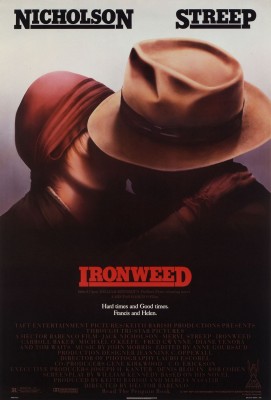
Video:
The widescreen transfer -- which very slightly modifies the film from its original aspect ratio of 1.85:1 to a new one of 1.78:1 -- is fair to quite good, with nice fidelity to both the film's mostly muted color palette and its rarer reprieves of color and light, and little in the way of aliasing or edge enhancement/haloing to be discerned. However, there are numerous, very brief and barely noticeable "pops" on the screen (isolated, very small, less than one-second-long lines or dots somewhere on the screen) to suggest that the print was less than perfect and not very extensively repaired. And, though there is a healthy amount of fine grain to clue us in that the film's celluloid texture hasn't been completely scrubbed away, a certain slightly bleary over-smoothness to some scenes suggests that someone went a little too far over to the digital noise reduction (DNR) side when making the transfer. Still, it's a decent job overall, with no flaws so distracting that they break your concentration.
Sound:The DTS-HD Master Audio 2.0 soundtrack is quite good; even though it's labeled as only 2.0, my system, at least, channeled the sound to all five speakers, with the film's dialogue, music, and important ambient sounds all fully, clearly present and sonorous, without any distortion or imbalance at any point. When the characters speak, or when a train goes by in the movie, it's like it's happening right in your living room; it's really surprisingly good sound.
Extras:None.
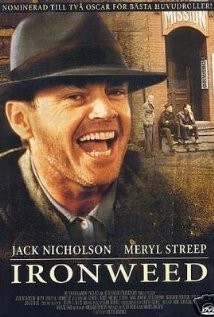
After his more interesting literary adaptation, 1985's Kiss of the Spider Woman, director Hector Babenco pretty well completed his transformation from activist-filmmaker in his home country of Brazil to feted Hollywood artiste with this 1987 slice of awards-bait, but it's not so bad as all that: The film is too well-designed, too self-consciously period-rific for its own good, yes; and try as chops-showcasing stars Jack Nicholson and Meryl Streep might, there was no way that the Hollywood rules of starpower were ever going to let them not gun for that spotlight in ways that are discordantly out of step with this very somber, very low-key story taken from William Kennedy's 1984 Pulitzer prizewinning novel (Kennedy also adapted the script). But neither is the film just a wet rag of timid pity and sentimentality. Babenco and Kennedy do manage to bring to the screen rich stretches of the stoically heart-wrenching, Depression-era toughness innate to Kennedy's compact but deep tale of a washed-up, guilt-ridden, drifting bum (Nicholson) and his similarly unmoored, sickly ex-singer girlfriend (Meryl Streep) as, over a few bitterly cold, unsheltered winter days in hard-hit Albany, New York, they drunkenly, inevitably wind their way down the no-going-back spiral that the haunting memories and disappointments of their lives, enmeshed indistinguishably with the literally deadly economic times, has set them on. It's a tug-of-war between the predictable conventions of "serious" acting-showcase Hollywood prestige pictures and the true, genuinely un-glamorous and soberly humane power of Kennedy's uncompromising vision, and the film becomes six of one and a half-dozen of the other, left with a reasonable amount of interest and dignity but pulled curiously flat between the opposing approaches. Just because it's not as profoundly engaging and moving as it could have/should have been, though, doesn't mean it doesn't work at all; it may occupy a gray zone between real art cinema and "artistic" cinema the way Hollywood tells it, but enough of the story's observational drama and well-integrated historical/social consciousness still shine through to make it a worthwhile watch and a respectable potential addition to one's Blu-ray library. Recommended.
|
| Popular Reviews |
| Sponsored Links |
|
|
| Sponsored Links |
|
|
| Release List | Reviews | Shop | Newsletter | Forum | DVD Giveaways | Blu-Ray | Advertise |
|
Copyright 2024 DVDTalk.com All Rights Reserved. Legal Info, Privacy Policy, Terms of Use,
Manage Preferences,
Your Privacy Choices | |||||||















